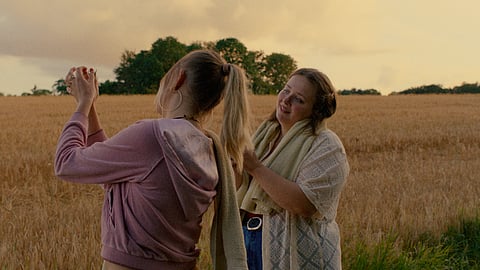

Emilie Thalund’s debut feature Weightless is a familiar coming of age story but one that plays out in an unusual setting—a health retreat. About teenager Lea (Marie Helweg Augustsen), spending the long summer away from home to lose weight, the Danish film is essentially a three-hander involving Lea, her roommate Sasha (Ella Paaske) and their trainer Rune (Joachim Fjelstrup). It had its world premiere in the New Directors competition segment of the San Sebastian Film Festival bagging its top award.
While you can pre-empt and predict a lot that transpires on screen, it’s Thalund’s gentle, tender, sensitive and sympathetic handling of the adolescent confusions and turmoil that lends the film freshness and sparkle. The novelty emerges from a happy marriage of the writing (Marianne Lentz, idea by Thalund herself), Louise McLaughlin’s cinematography, Andres Sondberg’s use of situational sound and the radiant performances, specially a wonderfully grasped and internalised and singularly mature act from Augustsen.
Lentz and Thalund deal with several issues and ideas in the script. The lack of self-confidence and overwhelming insecurity and inadequacy in the young intertwines and gets magnified with that of sexual awakening and flowering of their desires towards the attractive and popular peers, friends and acquaintances. Then there’s the judgmental world to contend with and the vulnerability it leaves adolescents with in having to live up to the ideals and expectations of others.
There’s the regular routine in the camp, of balanced meals, mandatory exercises and measurements with the phone kept away but for once in the evenings. “Feel good about yourself”, “You have no reason to hide” are the inspirations offered. Words that sound hollow and repetitive. Beyond the gyms and the dorms are the forests and beaches for the many trysts and dalliances, often questionable ones. Lea’s admiration borders on envy when it comes to her free-spirited, attractive roomie Sasha, the cynosure of all eyes, the local young men in particular. On the contrary, no one seems to notice Lea. Slender and alluring she may be, but Sasha is, perhaps, even more unresolved within, considered a bad influence in school, having most recently landed in trouble because of her affair with an older man.
It’s the charismatic, enticing trainer Rune who brings Lea’s smouldering feelings to fore. The friendly counsellor and confidant, is more of a signal of danger than security. The predator lurking behind the safe and sympathetic adult. While a 15-year-old going nutty on him is understandable, his own behaviour towards her feels indefensible, far from a relationship of equality, keeling over to powerplay and abuse.
Not much is spoken but delicately evoked through fleeting expressions and knowing looks and exchanges. The handheld camera moves fluently, with a rhythmic, choreographic polish, close to the actors, framing them—their faces and bodies—in uncommon intimacy followed by a move away to a distanced and detached perspective that gives a panoramic sense of expanse to the emotions involved. Even the unsettling and disconcerting decisive sequence is shot with a subtle elegance making the harsh and the exploitative even more stark.
The guiding point of view, however, is entirely Lea’s not just when it comes to her relationship with Rune but an equally complex female friendship with Sasha which is motivated as much by competitiveness and conflict as by solidarity. In the scheme of things, the end might feel a tad dissatisfying in not offering a proper closure. But given that the protagonist is a woman in formation, still figuring herself and her place in the world, the open-endedness is also entirely appropriate. What will become of Lea is a question that has the viewers invested and asking for more. Weightless is a problematic slice of youth portrayed poetically.